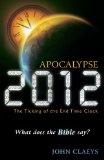Apocalypse 2012: The Ticking of the End Time Clock—What Does the Bible Say? By John Claeys. Sister, OR: VMI Publishers, 2010. 275 pp. Paper, $14.99.
Though Claeys does discuss the nearness of Christ’s return in the Epilogue (cf. pp. 209-19), that is not the focus of the book in spite of the fact that the title might imply that.
There are many outstanding aspects to this book. It defends the classic Dispensational view of Dan 9:24-27 (pp. 31-48). It has a nice discussion of the two witnesses in the first half of the Tribulation (pp. 49-56, 123-30) as well as of the 144,000 Jewish witnesses (pp. 64).
The discussion of Rev 17:8-11 is outstanding. Claeys lays out the first seven Roman emperors (p. 93), argues for a date of AD 68 for the writing of Revelation, and that the world ruler will be a man who suffers a mortal head wound and who is then possessed by the spirit of one of the first five Roman emperors, possibly Caesar Augustus (pp. 96-98ff.).
Contrary to most expositors, Claeys suggests that the Antichrist will not be the world ruler, but will instead be the religious leader who helps the world ruler (pp. 131-40).
A common problem for Free Grace people is why there is a sort of perseverance of the saints in the Tribulation in that no Tribulation saint will take the mark of the beast. Claeys suggests that “undoubtedly, some believers will be tempted to receive the mark of the beast,” yet God will keep them from doing so. One way he suggests is “by God causing their deaths before they can take that very wrong and disastrous step” (p. 145).
Discussion of two of the parables in the Olivet Discourse is masterfully done by the author. Claeys is careful to maintain a Free Grace understanding of these difficult texts (cf. pp. 27-30 re. Matt 24:45-51 and pp. 151-60 re. Matt 25:1-13).
Unfortunately there are no Scripture or subject indexes in this book. I found myself wanting to look up where the author discussed a passage, but being unable to do so. Hopefully in the second printing this will be rectified.
I personally remain unconvinced by the author’s suggestion that we can know today that we are within a few years of the Rapture (pp. 209-19). Claeys refers to the fact that Israel took over control of Jerusalem in 1967 and that slightly over 40 years, a Biblical generation, have since passed. He writes, “This may indicate that God has graciously given us a few extra years to prepare for the return of Christ” (p. 219). While that is not date setting, it is pretty close. “A few more years,” which the author implies is the most time we will have before the Rapture, is surely less than a decade or two. Thus he is strongly implying that the Rapture will occur by 2020. I remember in 1980 when I read Hal Lindsay saying that he didn’t know when Christ would return, but it would surely be by 1988 since Israel became a nation in 1948. While I wouldn’t be surprised to go in the Rapture before 2020, I am making plans for myself and my wife should we live another thirty or more years without the Rapture occurring.
The Apostle John said in the first century, “Little children, it is the last hour.” Likewise, the Lord’s brother James, possibly writing in AD 34, warned his readers, “Behold, the Judge [Jesus] is standing at the door!” (Jas 5:9). All of the NT writers believed that Jesus could well return in their lifetimes. So have all Bible-believing people since then. One of the men in our church loves to change a line in a song we sing called Coming Again. Rather than singing that it “may be soon,” he changes it to “shall be soon.” That is, of course, Biblically accurate. But it was soon 2,000 years ago and if Jesus tarries it will still be soon a century from now.
One of my seminary professors, a Jewish believer, said in 1981 that if Israel were kicked out of the Promised Land tomorrow, his faith in Jesus’ soon return would in no way be shaken. He pointed out that we cannot be sure that this is the final return of the Jewish people to Israel. There might be multiple exiles and multiple returns before the Rapture. That is certainly possible. There is no Scripture that tells us one way or the other.
With a few minor caveats, I recommend this book highly. It is an excellent treatment of the Scriptures concerning the Rapture and Tribulation and it is a strong call to live in light of the Lord’s soon return.
Robert N. Wilkin
Editor
Journal of the Grace Evangelical Society
Denton, Texas


